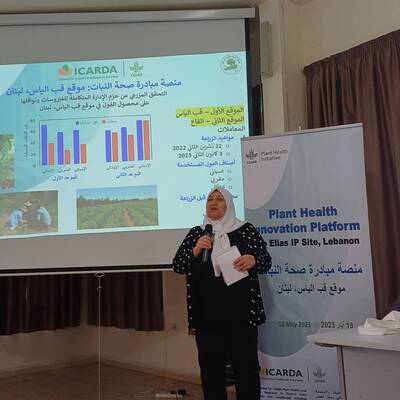CGIAR's Plant Health Innovation Platform launched at ICARDA Lebanon

CGIAR's Plant Health Initiative has selected the ICARDA Terbol Research Station as the site for the Plant Health Innovation Platform for CWANA.
Lebanon, May 13, 2023: The launch of the platform at Qob Elias Village in southern Lebanon was attended by farmers and key partners, including Mr. Jihad El-Maalem (the Mayor of Qob Elias), Dr. Khaled Makkouk (Vice-President of the International Society of Plant Pathology), Drs Rola Al-Amil and Elia Choueiri from Lebanese Agricultural Research Institute(LARI), and Dr. Khalil Akel (Head of Agriculture, Beqaa Division, Lebanese Ministry of Agriculture). Guests visited an on-farm integrated pest and disease management (IPDM) validation site in Qob Elias village and were given a full tour of the ICARDA Research Station in Terbol.

The Plant Health Innovation Platform (IP) plays key role in participatory pest constraint analysis, on-farm validation of pest management options, and scaling of subsequent innovations to improve crop yield and quality, thereby increasing incomes and food security for wider rural farming communities. The key to the initiative's success is the collaboration of multiple partners, including CGIAR, IARCs, NARES, and the private sector, each bringing unique expertise and knowledge to the table. As well as new pest management technologies developed at the Innovation Platform to support national farmers, pest management training are also provided. Farmers, development agents, policymakers, and young researchers are all included demonstrating the relevance of the integrated pest and disease management packages to diverse stakeholders.
During the launch, Safaa Kumari, ICARDA's focal person of the Plant Health Initiative, explained how the faba bean virus and vector management approach protects faba bean from an increasing prevalence of diseases due to climate change. Mohamed Abou Nasif (farmer) and Dr. Elia Choueiri, Plant Virologist from LARI, then outlined how the new IP can support the urgent need to reduce pests of major crops in Lebanon and improve food security in the country. Most importantly farmers at the event were given the opportunity to discuss the challenges they face under the increased threat of climate change and how CGIAR and partners can address their needs through evidence-based research. Including farmers in our research right from the start is an ICARDA priority to make sure our research is relevant, affordable and scalable.
The CGIAR Plant Health Initiative has launched eight other Innovation Platforms in Africa, Asia, and Latin America, for developing and testing pest management solutions for key crops in real-life settings. The Lebanon IP launch represents another tool in the ICARDA integrated innovation packages towards sustainable agriculture in the CWANA region, providing resilient livelihoods for farmers struggling with increasing climate impacts.
